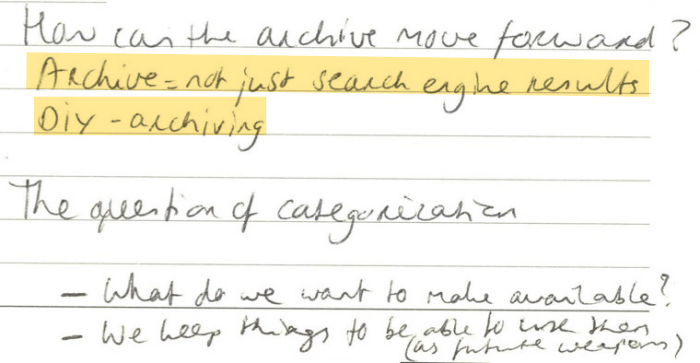Remix of a blogpost by Minke Vos and a debris of notes and tweets, complemented with a dispersed editors' note.
What remains of a publication after it has been published? How does its status change in the post-production phase? Does it survive and thrive or will it suffer a slow, unnoticed death? Some works keep circulating, others do not. Fragments live on in search engines, on platforms, or in physical space, aggregated, fragmented, or re-contextualized. How does the materiality, positioning, and design of the work influence this afterlife? How to design for sustainability of the publication? The constellation of readers, publishers, designers, and editors is under consideration. Why do we even publish and for whom? What does it mean to actually read nowadays? Why are aspects of time and space important in the positioning of a publication? When we shake off the idea of the book as a static object, we can start to look at other - social, emotional, material, and spiritual - aspects of publishing. The echoes of the afterlife will reverberate through new publishing strategies.
As publishing professionals, we are always looking for new ways to 'keep a publication alive' post-production, as well as new ways to design for the sustainability of a publication. What can we do to prevent books from collecting dust on bookshelves? During the Urgent Publishing conference presentation The Afterlife of Publications Marc van Elburg, Krista Jantowski, Cristina Garriga and Karolien Buurman each show how they strive to keep their publications sustainable.
Readers & publishers
Cristina Garriga presents Readers & Publishers, an online directory of independent publishers. ( http://readersandpublishers.org )
Cristina Garriga explains that there is a need among artists and writers to know how publishers work and how to reach each other. Readers and publishers, an online directory for independent publishers tries to close this gap by giving a potential author a clear and concise idea of what the publisher stands for, what kind of books they publish and what their submission policies are. Connecting the right authors and audience to the right publisher can ensure the sustainability of the publication.
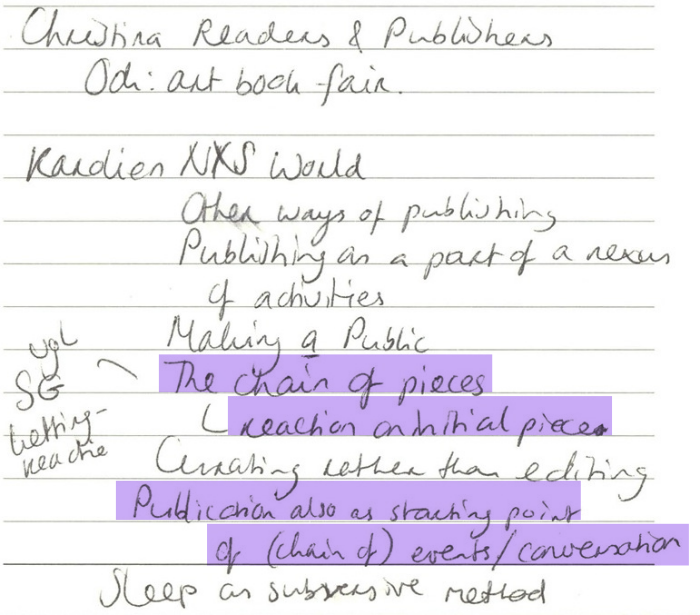
NXS
NXS is an Amsterdam based research collective that explores 'the self' in the age of digital technology through publications, exhibitions, art works, public events, and a working lab. http://nxs.world/
For Karolien Buurman, the answer lies in collaborating and creating a community. She works for NXS, a collaborative research project that explores "the self" in the age of digital technology. NXS publishes twice a year. Each contributor responds and reflects on the work of another contributor. In addition to the publications, NXS hosts lectures, performances and exhibitions around the theme of the publication. In this way, they create a community that is much broader than their readership.
Parasiting Zine Culture by Marc van Elburg
Marc van Elburg (NL) is an artist and zinester. He was the founder of experimental DIY noise theatre and zine library de Hondenkoekjesfabriek, and a curator for Planetart. Currently he is looking after the Zinedepo zinelibrary in Motel Spatie in Presikhaaf.
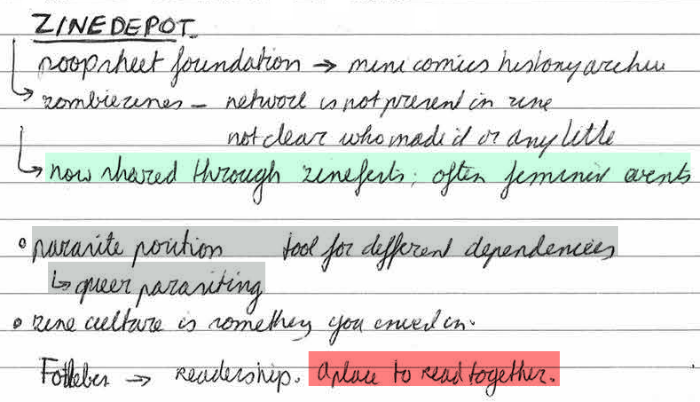
Mark van Elburg talked about the Zinedepo zinelibrary in Motel Spatie in Arnhem. He explained that the zine culture, particularly that of the 1990s, acted outside commercial consumerism culture, and therefore outside of convention. The zine culture was a close-knit community. One zinester might have included the names of several other zines on the same topic, and where to get them. Van Elburg referred to this as DIY culture.
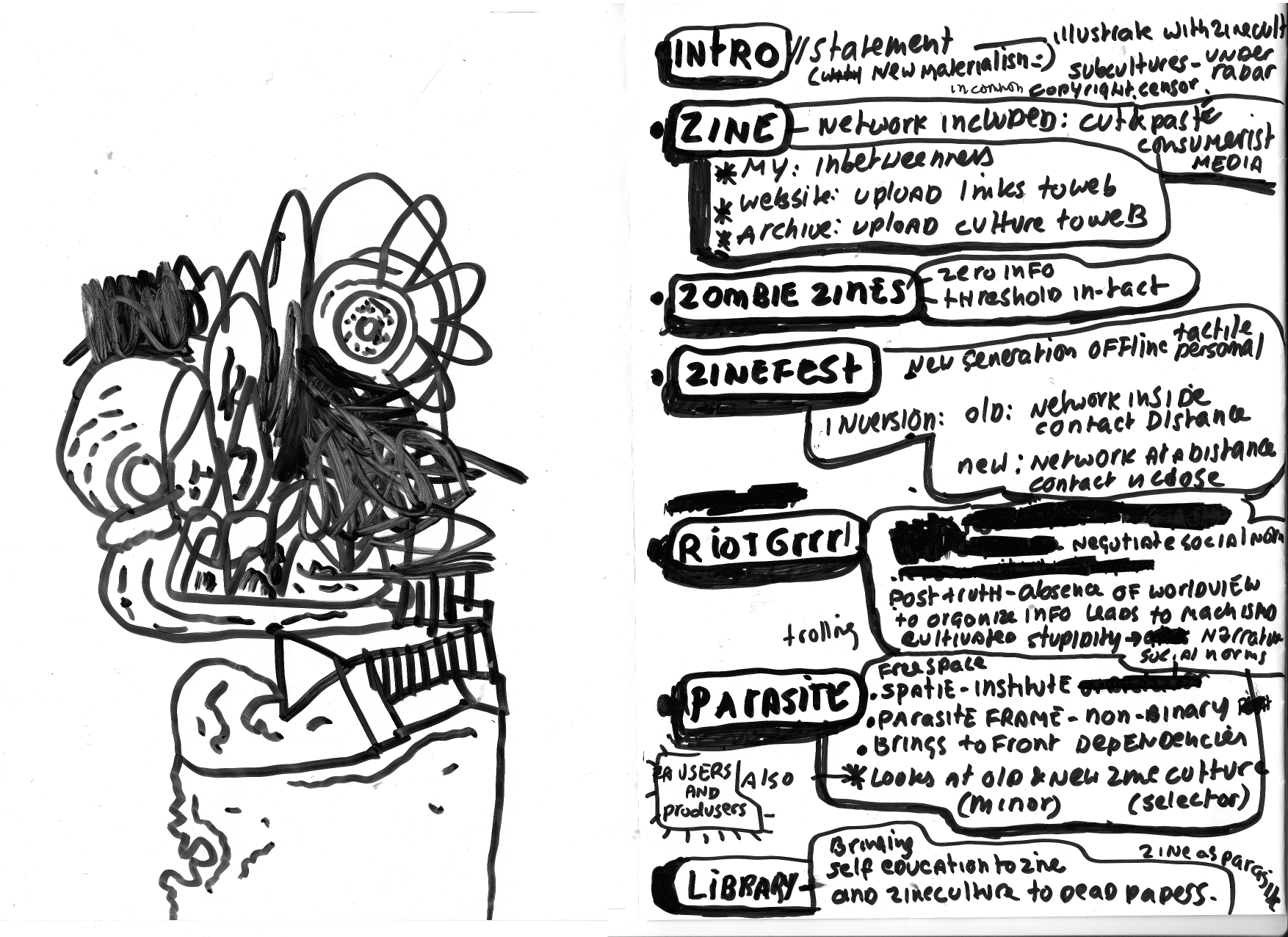
Notes by Marc van Elburg.
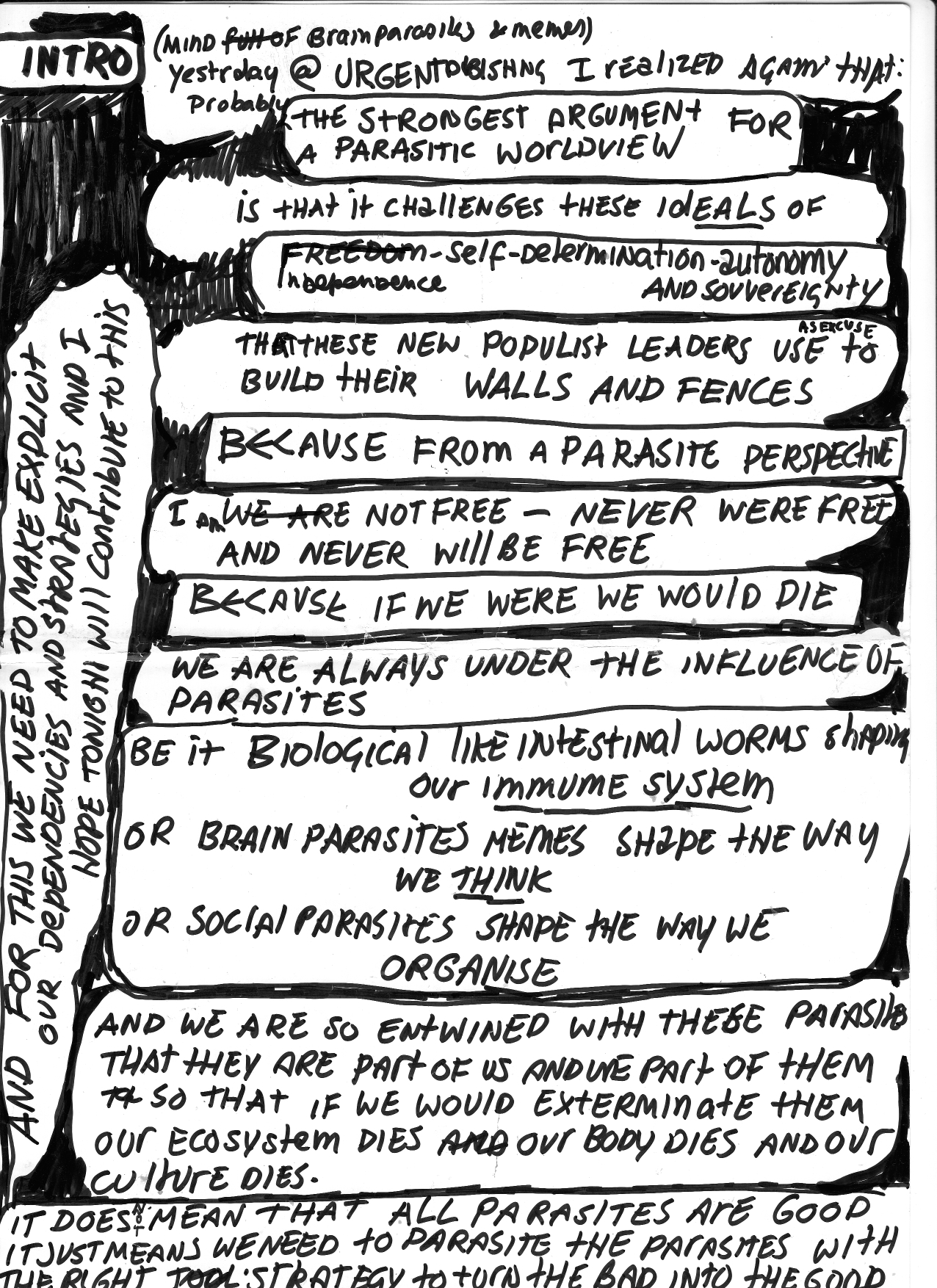
Notes by Marc van Elburg.
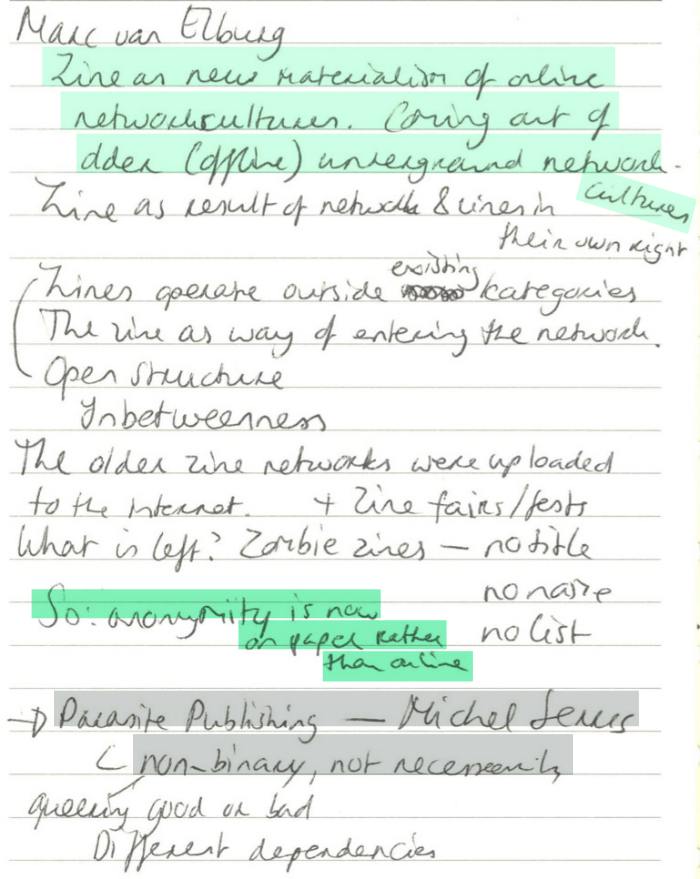
A Much Needed Location for a Community of Readers by Krista Jantowski
Krista Jantowski (NL) is co-owner of WALTER; a (for lack of a better word) bookshop in Arnhem (NL). Her academic background is in film studies, her work back-ground in organizing and curating, her interest lies with reading as a social practice.
Krista Jantowski of Walter Books in Arnhem explained the importance of the bookshop not just as a place of commerce or a temporary storage room for books, but as the starting point of the circulation of knowledge. Bookstores are places where communities can come together and share knowledge and opinions.
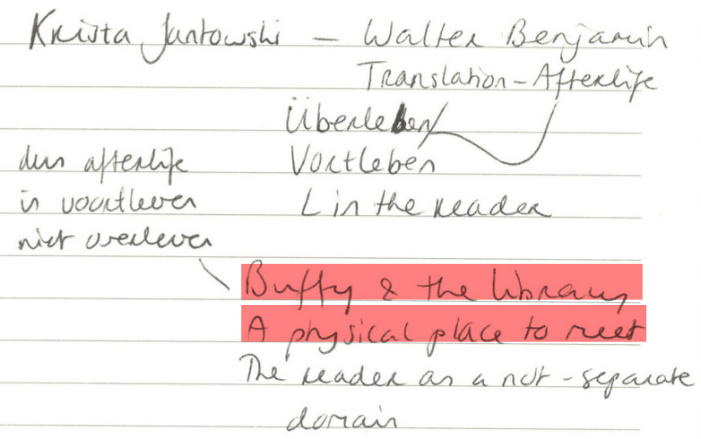
Padmini Ray Murray
Instead of the planned talk by Alice Twemlow, Padmini Ray Murray stepped in and gave a presentation.
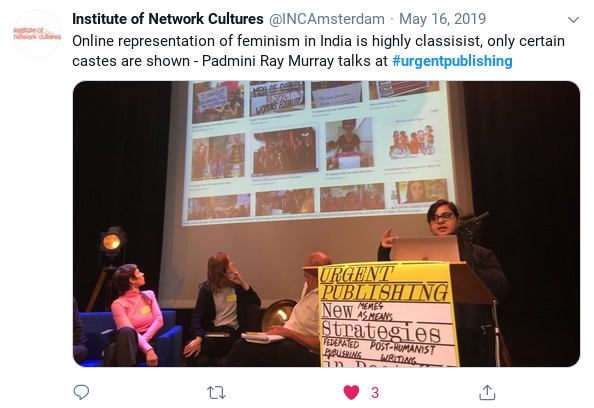
Tweet by Institute of Network Cultures.
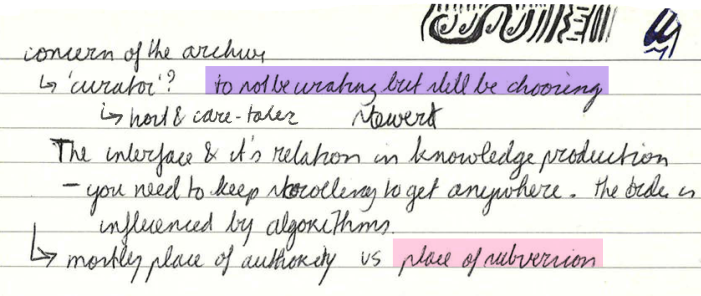
Dispersed editors' note: Considering the archive is a fundamental aspect of publishing. An important facet of this afterlife was brought forth by Padmini Ray Murray. Understanding the archive as activism, Padmini Ray Murray's called for decentralized servers hosting DIY archives as a way of providing a counterpoint to massive archiving projects by the likes of, for example, Google. Giving the example of Google Arts & Culture's project "Women in India: Unheard Stories", Ray Murray stressed that all the material Google has received from many Indian cultural institution merely serves as a corpus to train their machines. One way to tell this is through its interface, which is cryptic at best. According to Ray Murray, the relationship between interface and knowledge production is a very important one: the ones in charge of the archive determine how the subject is represented. Ray Murray is therefore critical of the ability of profit-led corporations to truly forward the interests of the represented subjects. Such an archive must be challenged. The taxonomies and categories of the Internet, as a consequence of the Enlightenment project, must be exploded: "As scholars, as thinkers, as makers it is also on us, I think, to jam the archive, and to make the ways that the digital archive thinks about how the world is represented, how history will be read, or how history will be understood."
Padmini's question.
Padmini's answer.


Tweet by mikrotext.

Conclusion
Each in their own way, the speakers highlighted that it is important for publishers to actively work towards bridging the gap between authors, readers and themselves, to build communities, to bring people together, and to collaborate within and outside of your own network. It is high time to stop looking at the book simply as a product. The speakers of The Afterlife of Publications have shown that the book, or any other publication, can serve as a catalyst for connection in the 'post-truth' era.
